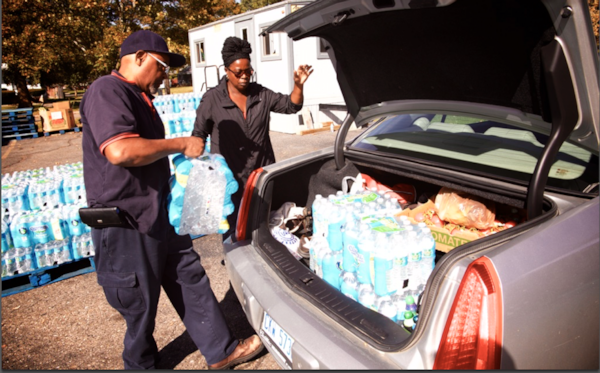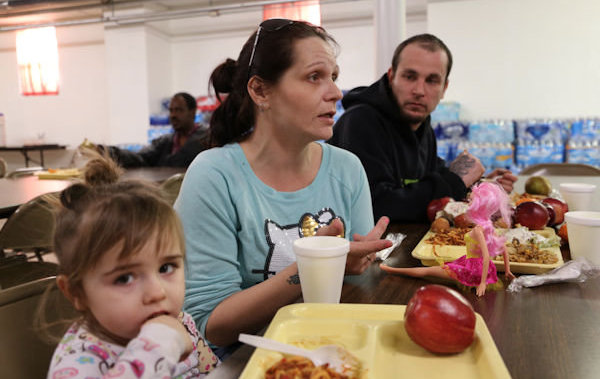With State resourcing greatly reduced, The Michigan Conference is stepping up aid for Flint.
KAY DEMOSS
Senior Editor-Writer, Michigan Conference
“We do water! But we do so much more than water! We do gospel!” Greg Timmons may be a United Methodist layman but Greg acts as both preacher and prophet on behalf of the residents of Flint, Michigan.
Since August 2016 Timmons has served as Executive Director for Flint Restoration for The United Methodist Church. Working with the Crossroads (soon to be East Winds) District of The Michigan Conference, he has indeed managed hundreds of thousands of bottles of water. In fact, he reports that he just received word that another denomination is poised to put “22 trucks of water” on the road to Flint. (That’s 18 palettes each truck, 1,700 bottles per palette). Yes. Greg knows water.
Greg also knows Jesus. And that has compelled him to doggedly address issues of generational poverty. “Giving people hope is what the church does,” he says. “Hope and godly values will stabilize homes and create a self-healing and self-sustaining society in Flint.” He looks at the situation on the ground in the city and observes, “We don’t just ask people to give in order to do stuff. The church has the opportunity to be missional in our giving.”
Giving and doing and being in mission have become even more critical as the State of Michigan announced on April 6th that they were ending the distribution of free bottled water. That action is based on the State’s evaluation that the city’s tap water is now healthy to drink. Read the report in The Detroit Free Press.

Prior to April 6, the State had been distributing water at three Help Centers in Flint hosted by Bethel and Asbury United Methodist churches and Greater Temple Church of God in Christ. Those Help Centers had been in operation since November 2016 thanks to a $2.5 million grant from a collaboration of organizations, including PepsiCo, administered by the Food Bank of Eastern Michigan. Water, lead-mitigating food, personal care items and health care were available at the Help Centers four days a week, 10am – 4pm. Greg shared the water recovery story earlier this year.
When the State distribution of bottled water ended, the PepsiCo and Food Bank support ended as well. The Help Centers closed at the end of March. However, since April 16th the Help Centers have re-opened thanks to Genesee Health Systems, the Michigan Department of Health and Human Services, and remnant dollars from the original funding. With no paid labor force, volunteers are being recruited.
However, the Help Centers now are open only one day a week instead of four, 10am -2pm (Bethel on Monday and Asbury on Tuesday). Home delivery of water has continued thanks to dollars from the Bishop’s Fund of The Michigan Conference. Home delivery is handled out of Calvary and Asbury United Methodist churches five days a week.
When asked his thoughts about the current situation, Greg Timmons said, “I feel frustrated that the state has withdrawn from its commitments.” He quickly adds, “But I am excited about being responsible for our own future.” The United Methodists continue to work as a member of the Community Resource Group. The network includes the Community Foundation, Mott College and Foundation, Genesee Health Systems, Catholic Charities, Social Security, the Michigan Department of Health and Human Services, and churches of various denominations.
He says of the network, “There is excitement that we are taking accountability for our own community’s success rather than looking to the State to drive our success.” He describes what happened when the Community Resource Group got in a room to determine how to move forward. “There was a sense of chaos and helplessness. Now there is a sense of focus and purpose,” Greg concluded.
On April 16, 2018 the Help Center re-opened at Bethel United Methodist Church in Flint. Volunteers helped fill the food containers to be given out at the Help Center. ~Facebook photoThe Michigan Conference has issued a new funding campaign for Flint Restoration. Timmons offers four ways for people to participate in “community stabilization” moving forward.
- Money is needed for water, enhanced education, job training, counseling, and crime-reduction ministries. Financial gifts may be given online by clicking here or by check payable to Crossroads District Board of Missions, attn Flint Recovery. Send checks to Crossroads District Board of Missions, 119 S. Leroy Street, Fenton, MI 48430, attn Linda Squires, Treasurer.
- Volunteers are needed until paid staff can eventually be hired. Call Greg Timmons at 810-922-2257 to schedule some hours at a Help Center.
- Provide a shipment of water for distribution at a Help Center or for Home Delivery. Call Greg at 810-922-2257.
- Pray that God’s hands will move on the City of Flint and that the Holy Spirit will fill hearts so that lives will be transformed.
What’s ahead? Timmons says there are some bills going before the legislature that, if passed, may provide new state funding. Also on Greg Timmon’s radar is a proposal to provide reverse osmosis filtration systems for the three largest schools in Flint. The schools relied on bottled water provided by the State.
“Streams of mercy, never ceasing … “The United Methodist Church of Michigan is committed to Flint, transforming a toxic crisis into a stable community.
Last Updated on January 31, 2024

